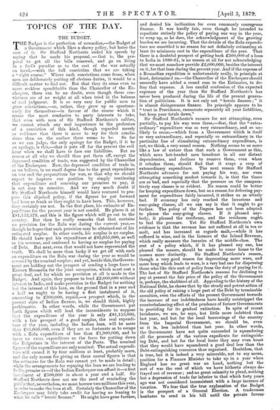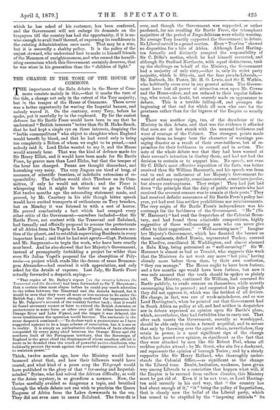TOPICS OF THE DAY.
THE BUDGET.
seems the most conducive to party interests to take, that even with men of Sir Stafford Northcote's calibre, we cannot attach any real importance to the profession of a conviction of this kind, though regarded merely as evidence that there is more to say for their conclu- sions than on the surface there seems to be. So far as we can judge, the only apology for the Budget, if it be an apology, is this,—that it puts off for the present the evil hour when we shall have to face our liabilities. But no reason at all why we should thus put them off, except the depressed condition of trade, was suggested by the Chancellor of the Exchequer. Now, the depressed condition of trade is, as we believe, in no small degree due to the great expenditure on war and the preparations for war, so that why we should expect to improve our position by simply continuing that expenditure and renewing our promises to pay, it is not easy to conceive. And we very much doubt if Sir Stafford Northcote himself would have ventured to pro- pose this slipshod policy, if the figures he put forward had been as frank as they ought to have been. This, however, they certainly are not. In the first place, his estimate of Ex- penditure for the present year is not candid. He places it at £81,153,573, and this is the figure which will go out to the country. But then he coolly remarks that that contains no provision for the Zulu war during the current year,— though he hopes that such provision may be obtained out of his estimated surplus. In other words, his surplus is no surplus. He should have put his expenditure at £83,055,000, as well as his revenue, and confessed to having no surplus for paying off Debt. But next, even that would not have represented the truth. We shall be more than lucky if we get off with such an expenditure on the Zulu war during the year as would be covered by the nominal surplus; and yet, beside this, the Govern- ment are holding out the prospect of sending a large force to Eastern Roumelia for the joint occupation, which must cost a great deal, and for which no provision at all is made in the Budget. And again, they propose to lend £2,000,000 without interest to India, and make provision in the Budget for nothing but the interest of this loan, on the ground that in a year and a half we ought to be having a first instalment of it, amounting to £300,000, repaid,—a prospect which, in the present state of Indian finance, is, we should think, highly problematic. In other words, while the Government put forth figures which will lead the inconsiderate to suppose that the expenditure of the year is only £81,153,000, with a fair prospect of a good surplus, the real expendi- ture of the year, including the Indian loan, will be more than £85,000,000, even if they are so fortunate as to escape with a Zulu expenditure of less than £1,900,000, and to incur no extra expenditure on the force for putting down the Bulgarians in the interest of the Porte. The nominal figures of the expenditure are only nominal. The actual expendi- ture will exceed it by four millions at least, probably more, and the only reason for giving us these unreal figures is that the estimates for the Zulu war cannot yet be made in detail ; while the arrangements for repaying the loan we are lending to India, promise us—if the Indian Exchequer can afford it—a first instalment of £300,000 in about a year and a half. Sir Stafford Northcote does not see the need of reminding the public that, nevertheless, we must borrow two millions this year, in order to make the loan at all. Certainly the Chancellor of the Ezehequer may fairly take credit for having no leaning to what be calls " heroic finance." He might have gone further, and denied his inclination for even commonly courageous• finance. It was hardly fair, even though he intended to- repudiate entirely the policy of paying our way in the year, to wrap up, as he does, the acknowledgment of the growing burden we are incurring. That the details of the Zulu expendi- ture are unsettled is no reason for not definitely estimating at least its minimum cost in the expenditure of the year. That. there is a doubtful prospect of getting back £300,000 of a loan• to India in 1880-81, is no reason at all for not acknowledging that we must somehow provide £2,000,000, besides the interest on it, for that loan during the present year. And if the expense of. a Roumelian expedition is unfortunately really, in principle at least, determined on,—the Chancellor of the Exchequer should assuredly have added a round sum to the Estimates, to de- fray that expense. A less candid confession of the expected expenses of the year than Sir Stafford Northcote's has never been produced during the life of the present genera- tion of politicians. It is not only not " heroic finance ; " it is almost disingenuous finance. Its principle appears to be. " trust in Providence, enumerate separately all your liabilities„ but keep your totals down."
Sir Stafford Northcote's excuses for not attempting, even_ partially, to pay his way were three,—first, that the " extra- ordinary" expenditure was so very extraordinary, and so un- likely to recur,—which from a Government which is itself so very extraordinary, and especially so extraordinary in the particular line of stimulating extraordinary expenditure, is not, we think, a very sound reason. Nothing seems to us more like a law of nature than that such a Government as this,. which sows hot-headed men broadcast in all our distant dependencies, and declines to remove them, even when it rebukes them, should find that it reaps a crop of extraordinary expenditure. The next reason Sir Stafford Northcote advances for not paying his way, nor evert attempting something modest towards it, is that the times are so bad, and especially that the pressure on the compara- tively easy classes is so evident. No reason could be better- for keeping expenditure down, but as a reason for deferring pay- ment for expenditure fairly incurred, it strikes us as utterly- bad. If economy has only reached the luxurious and easy-going classes, all we can say is that it ought to go, farther. The policy of the Jingoes has not been adopted, to please the easy-going classes. If it pleased any-- body, it pleased the residuum, and the residuum ought: to feel the pressure. Yet Sir Stafford Northcote's own, evidence is that the revenue has not suffered at all in tea or malt, and has increased as regards malt,—while it has suffered in wine, and in the licences of the Inland Revenue,. which really measure the luxuries of the middle-class. The cost of a policy which, if it has pleased any one, has the masses, should be made to come home to the masses more distinctly. Sir Stafford Northcote's reason,. though a very good reason for deprecating more wars, and more brag which leads to wars, is a very bad one for dispensing those who like this sort of policy from the duty of paying for it. The last of Sir Stafford Northcote's reasons for declining to- pay at present the fair price of the policy of the Government is, perhaps, the shabbiest of all. Appealing to the history of the National Debt, he shows that by the steady and potent action of the old policy of raising a large part of the Debt by terminable annuities, even the efforts of the present Government towards the increase of our indebtedness have hardly outstripped the counterbalancing effect of the prudence of former Governments in providing for its gradual extinction. In spite of recent lavishness, we are, he says, but little more indebted than last year, and but for the local borrowings of the country from the Imperial Government, we should be, even as it is, less indebted than last year. In other words,. the Government have not quite succeeded in squandering all the proceeds of the various expedients for extinguish-. ing Debt, and but for the local loans they may even boast. that they would have squandered a good deal less than the Debt-extinguishing resources thus organised. Doubtless, that is true, but it is indeed a very miserable, not to say mean, position for a Finance Minister to take up in a year when England has no great war on hand, nothing but the sort of war the cost of which we have hitherto always de- frayed out of revenue ; and no great calamity to plead, nothing but a depression of trade far inferior to that which forty years ago was not considered inconsistent with a large increase of taxation. We fear that the true explanation of the Budget is the prospect of a General Election. A tradesman .hesitates to send in his bill until the private favour which he has asked of his customer, has been conferred, and the Government will not enlarge its demands on the taxpayers till the country has had the opportunity, if it is un- wise enough to avail itself thereof, of expressing its confidence in the existing Administration once more. That may be a wise, but it is assuredly a shabby policy. It is the policy of the unjust steward, who understood how to make to himself friends of the Mammon of unrighteousness, and who earned the humili- ating encomium which this Government certainly deserves, that he was wiser in his generation than the " children of light."



































 Previous page
Previous page